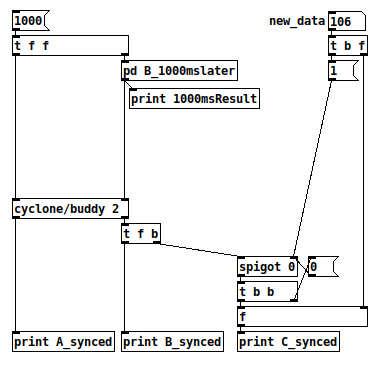@FFW said:
@ddw_music It could be a solution but in certain case I don't need all the inputs so it can't be generalized.
Sure it can -- or at least it can be adapted.
Let's say you have 3 inputs: A is synchronous, B should use whatever the last value was (and doesn't need to be received every time), and C is asynchronous. You could have
[t f b f]
| | |
[A] [f] [C]
| | |
[buddy 3 ]
... and the [f] receives new values in the cold inlet.
Because a [t] is driving the process at the top, you can guarantee that something goes into every inlet of the buddy object. However there's no requirement that these be new data. If there were such a requirement, then indeed it would be true that it couldn't be generalized. But [f], [symbol], and [list] objects remove that restriction.
I'm glad to see you found another way -- just pointing out that buddy is not quite so inflexible.
hjh




